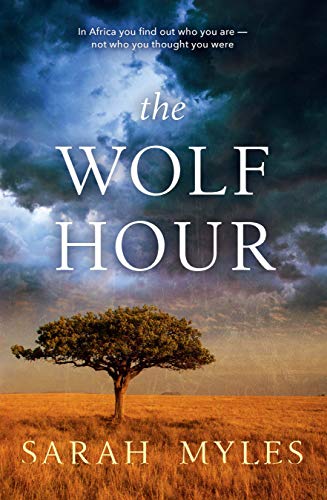 Reviewed by Magdalena Ball
Reviewed by Magdalena Ball
The Wolf Hour
by Sarah Myles
Allen & Unwin
ISBN: 9781760632519, August 2018, 352 pages, Paperback
The Wolf Hour opens in 2008, with 30 year old Tessa Lowell, an idealistic PhD student who has been studying the impact of PTSD on child soldiers in Uganda for several months. Tessa works with Dominic Oculi, a former abductee and child soldier himself, now rehabilitated and working to negotiate a peace deal with the Lord’s Resistance Army (LRA), and its volatile leader Joseph Kony. When Tessa insists, against Dominic’s advice, that she tag along with his peace delegation, she is kidnapped over a misunderstanding of what kind of doctor she is. The result is devastating, not only for Tessa, but for the delegation and for her family. The story is richly rooted in time and place, and Myles does a superb job of conveying both the beauty of Uganda, and the strange, sometimes horror, of what Tessa carefully observes. The book opens with a ceremonial purging seen through Tessa’s eyes that tells us more about the protagonist than any description of Tessa could:
The boy’s father nodded and Oraako sat down on the branch-swept earth. Placing the bowl at his son’s feet, the man dipped his gnarled hand into it and sprinkled water on Oraako’s wounded foot, then took the chicken from his wife and with one deft spin broke its neck. Tessa watched. She would record the details later, noting the way the boy’s father laid the bird on the ground, how he used the panga to leave it in two, then wiped its blood and faeces onto Oraako’s hands and infected foot. (3)
The story progresses at a rapid pace, driven forward by the unfolding danger of Tessa’s position, her growing sense of the blindness and protections her privilege and easy upbringing in Melbourne has afforded her, the sense of helplessness felt by Tessa’s parents, Leigh, a (medical) doctor and Neil, a documentary maker, and her brother Stephen, a “businessman” living in Cape Town. When Neil and Leigh are notified of Tessa’s abduction, they call upon Stephen to help rescue Tessa. As Tessa’s dangerous situation plays out, Stephen’s nefarious and covert business dealings begin to unfold, unhinging the relationship between Leigh and Neil and forcing them to question their own beliefs.
Myles builds the story in alternating chapters that explore the parents growing awareness of their adult childrens’ activities, as well as Stephen’s perspective – one that highlights the privileged upbringing that Tessa and Stephen had, but also opens a range of questions about the interconnectedness of the events that unfold. Throughout the novel, Myles’ writing is exquisite, walking a careful line between the psychological introspectiveness of her characters, and the unfolding events of the Ugandan Civil War and its impact on the lives of people living there. Tessa’s observations in particular are poetic and careful, illuminating Africa’s beauty against her own frailty:
A steady rain began to fall, producing the faint arc of an opaque moonbow. It shone iridescent, if diluted, but when the moon went behind a cloud its extraordinary beauty was lost and the night became a vast black ocean. They found a sheltered place and stopped to rest, drinking rainwater from the waxy drip-tips of broad leaves and waiting for what had become a downpour to ease. (225)
The link between Tessa and thirteen year old Francis, an abductee and soldier who she meets at the talks and later a the LRA camp, is both moving and disturbing. Through Francis, Tessa learns about the shocking violence that Francis endured and participated in, and gets a far more in-depth awareness of PTSD than she ever wanted. Though the plot develops around Tessa’s kidnapping, The Wolf Hour covers a lot of other ground, exploring the family dynamics between Tessa, Stephen, Leigh and Neil, and the broader, but paralleled relationship between Uganda and those who continue to profit from war and the pain it creates.
As parents, Leigh and Neil are credible and rational, and Leigh’s narrative in particular is compelling as she begins to suspect that her intrepid, high-achieving children are not quite as they appear. As the antagonist, Stephen is the least appealing character, with an icy, slightly exaggerated greed that is unfortunately familiar. However, he makes it clear to Tessa that there is no such thing as unfettered innocence, and that we are all, in some way, connected, and culpable:
she had come all this way only for Stephen to show her what she most feared about herself, and there was a flicker in his eye that told her he understood: You’re the problem; you should think more about yourself before judging me. (252)
The Wolf Hour is a powerful and subtle novel that raises big questions and doesn’t shirk from depicting the ugliest aspect of the Ugandan Civil War, including its impact on the people of central Africa, especially the children, nor does the book shirk from exploring the way in which Neocolonialism feeds and supports these wars. Myles’ depiction of Uganda is well-researched and engrossing. The Wolf Hour is an important work of fiction that continues to be timely, thought-provoking, engaging and impactful.